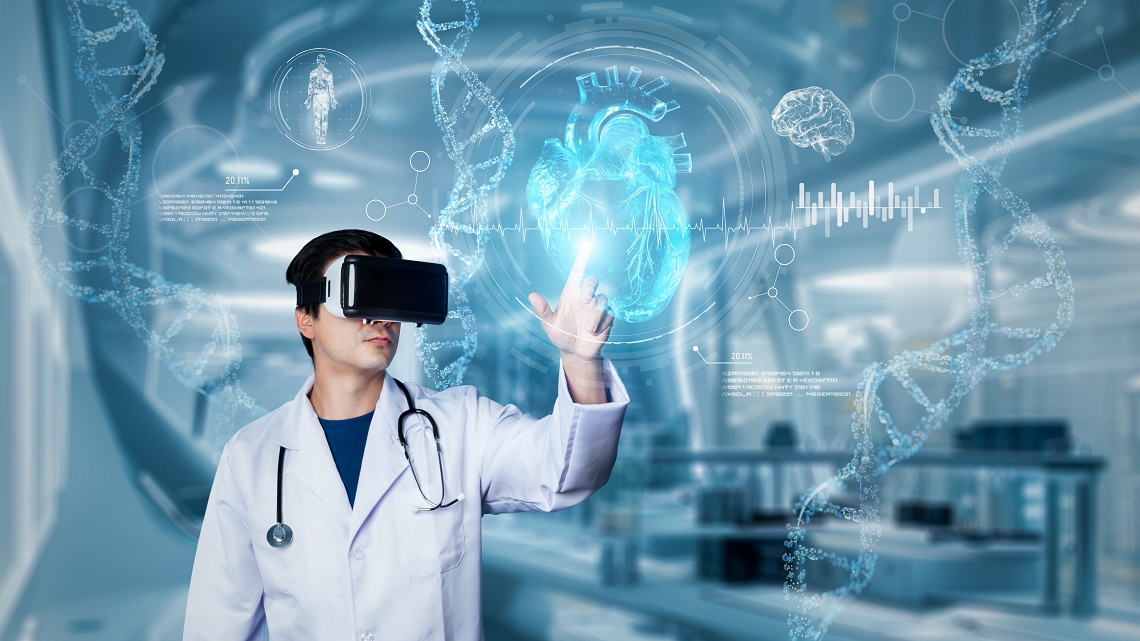
Healthcare is one of the key domains predominantly using VR integrations. The technology is beneficial for effectively streamlining anxiety management, rehabilitation therapy, and surgical training. With the continuous developments in heightened CGI systems and advanced organ imaging, VR solutions will unlock improved patient outcomes, enhance clinical precision, and enable faster recoveries.
Underlying Mechanisms: How & Why VR Works in Medicine
Immersive simulation
In the context of medicine, virtual reality works through immersive tech simulations. In other words, using virtual reality technology professionals can replicate real world 3D environments by sensory immersion, spatial interaction and 3D modeling. This facilitates professionals in the healthcare sector to reduce incidence of medical errors and advance patient safety. The provision to replicate highly complex scenarios like neurosurgery and orthopedics or mass casualty events enables healthcare professionals make rapid decisions and train faster.
Neuro-physiological and psychological basis
VR influences the neuro psychological part of the brain that interprets pain, anxiety and movement. The technology can be utilized to enhance cognitive functions by improving attention, memory, improves motor learning and executive function such as problem enabled through providing immersive and multisensory experiences. VR environments facilitate a safer, realistic and engaging environment to patients and enable fast recovery from trauma,and stroke, changing brain adaptations similar to neuroplasty.
The evolving synergy between VR and AI
The combined application approach of VR and AI opens possibilities to heightened personalization, adaptive simulations and more realistic medical training for improved patient care. The advanced potential of AI including automation and predictive insights, AI driven VR platforms enabling the analysis of user performance and biometric data to more effectively align with patient needs, personalized autonomy for surgical planning, and provide realistic training for therapy and psychosis.
Core Clinical & Therapeutic Applications of VR Technology
- Diagnostics & Early Detection
Virtual reality can be leveraged for a wide range of surgical, rehabilitation, clinical and therapeutic applications. With the capability of 3D visualization and data imaging, VR models can replicate the conventional 2D scans like CT and MRI into 3 dimensional models. This helps the medical professionals effectively interpret anomalies in medical imaging, and detect complex details like tumors near the vessel which traditional imaging techniques fail to identify. VR is also useful for evaluating early stage cognitive declines such as ADHD, Attention issues or Atypical response patterns etc. via creating virtual but realistic scenarios.
- Surgical Training & Pre-/Intra-operative Planning
VR is providing a safe and repeatable environment for practicing complex surgical procedures including laparoscopic, orthopedics or neural operations. Having a realistic virtual environment will continuous feedback loops allow medical professionals to refine skills and become advanced in surgical practice, leading to less errors and risk toward patient safety. Utilizing 3D economic models for surgical trials, help them conduct procedures in an enhanced level of precision, anticipating complications.
- Pain, Stress, and Anxiety Management
One of the most beneficial applications of virtual reality is it serves as a great tool for stress reduction, and anxiety management. VR technology integrations can be used to create guided relaxation or distraction based scenarios, which makes significant changes in the way a person perceives stress or pain in the brain. In contexts like wound dressing, blood draws, or chemotherapy, this facilitates holding patient attention and restructuring the pain signals. Also, with the exposure to calming scenarios using VR applications, specially post-surgery or conditions of chronic emotional strain, helps patients alleviate anxiety.
- Mental Health & Behavioural Therapy
The facility of highly controlled therapeutic environments supports cognitive behavioral interventions, phobia treatment, and exposure therapy. Typically, the phobias of height, crowded environments, scenarios of trauma can be healed under expert clinician guidance with the application of simulated VR environments in healthcare. PTSD, addiction management, and social anxiety etc. are the commonly addressed clinical conditions using VR, with repeatable and personalized therapeutic treatments.
- Rehabilitation & Physical Therapy
In rehabilitation, VR is used to facilitate highly engaging, gamified, personalized and task focused therapeutic exercises with real-time feedback to enhance the neurological interpretations for fast recovery. By replacing the tedious rehabilitation techniques with engaging therapies, elevating patient motivation, improves balance and their motor skills to expedite rapid healing.
The Future of VR in Healthcare
- Emerging trends
Virtual reality is primed to transform the healthcare industry with new waves of advancements in 3D medical imaging, training, pain management, physical therapy, and mental health. The Integration of AI and ML paired with VR, provides faster and real time biometric performance data.
- Personalized therapy and Adaptive rehab
VR technology is advancing its capabilities to deliver hyperpersonalized therapeutic journeys in the upcoming years. By the help of systems which can adapt real time patient data including heart rate, muscle activity, attention levels etc., it facilitates accelerated recovery from pain, adjusts pace and difficulties, and enhances therapeutic efficiency.
- Potential evolutions
Apart from personalized therapy, tailored treatment plans, dynamic difficulty adjustments, VR with BCI integrations, digital twins and metaverse, it introduces new revolutions in rehabilitation, surgical approaches, and the concept of virtual hospitals.
Conclusion
The integration of virtual reality in healthcare has significantly transformed the vertical of modern age healthcare practices. By providing advanced provision to training, diagnostic precision, anxiety control, and engaging rehabilitation therapy, VR is initiating a major paradigm shift in the healthcare sector. With the rising research and developments in this area, and the merge of AI, ML and AR integrations, professionals are able to conduct surgeries with advanced precisions, improved diagnostics and treatment with entire organ simulations and patients can derive value from virtual hospital walks.
For more articles, visit The Healthcare Insights.
